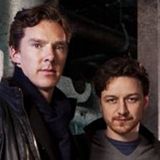On March 18, BBC Radio 4 will premiere a star-studded adaptation of Neil Gaiman's Neverwhere. Benedict Cumberbatch (Sherlock), Natalie Dormer (Game of Thrones) and James McAvoy (X-Men First Class) will appear -- or at least their voices will -- in five 30-minute installments that will air in the U.K. over the course of one week. It's been almost two decades since Gaiman's Neverwhere appeared on British television, and it’s since spawned a novelization, comic series and a stage play. A radio play, crazy and archaic though it may sound, is a fantastic idea for reanimating a sci-fi series -- and one that American producers should adopt.
There was a time when American radio was studded with fabulous tales told through sound. The adventures of Buck Rogers, Flash Gordon, the Lone Ranger, Superman, the Green Hornet and many more could be heard from the 1930s and ‘40s well into, in some cases, the 1950s (you can still listen to some of them at RadioLovers.com. But while the BBC maintained a strong tradition of presenting serialized radio dramas, dramatic radio on U.S. commercial stations dropped off after television became a fixture of American homes. During its early history, NPR broadcast several radio dramas, including a 1981 play based on Star Wars, starring none other than Mark Hamill. But, by the early 2000s, NPR had canceled the majority of its regular fiction offerings.
So why do I think Americans should seek out and produce more radio dramas? Because radio is tenacious, infectious and, most importantly, personal.
Take the mother of all radio dramas, War of the Worlds. When Orson Welles broadcast his adaptation of H.G. Wells' novel in October 1938, audience members were so startled that many actually believed the United States was under attack. And before you say that this could only happen in a more innocent time, Radiolab reported that two separate rebroadcasts of War of the Worlds in 1949 and 1960 had the same result. People believed the story. Even with our creepy-real modern visual effects, most experienced movie-watchers can point out where the seams are. Radio doesn't transport you to another world with effects, it takes you there with words. You are left to trust your narrator, the voices in your ear. I once had a teacher who was fond of saying, "Radio is a visual medium." When you hear descriptions of space invaders out of the mouth of a talented actor, something imaginary (and almost unbelievable) can become visually, viscerally real.
Take, for example, this recent story from The Truth, "Do You Have a Minute For Equality." I first heard it while driving down a dark, snowy street. I knew the actress telling me this creepy little tale wasn't actually entering a room full of teeth, but the extra step of suspending my disbelief -- not just waiting for everything to be realized in front of my face in full-frame HD -- made me a participant, complicit in the story. And if you think about it, that's a far more interactive way to get your entertainment fix.
I have high hopes for the BBC 4 adaptation of Neverwhere. In addition to McAvoy as Richard Mayhew, Cumberbatch as Islington and Dormer as Door, the play will feature Homeland's David Harewood as Marquis de Carabas, Sophie Okonedo as Hunter, Buffy alum Anthony Steward Head as Croup, Romola Garai (Atonement) as Jessica, and Sir Christopher Lee (Lord of the Rings) as the Earl of Earl's Court.
With a cast of this caliber, I am hopeful the actors can weave together a vision of London Below as vivid as anything.

